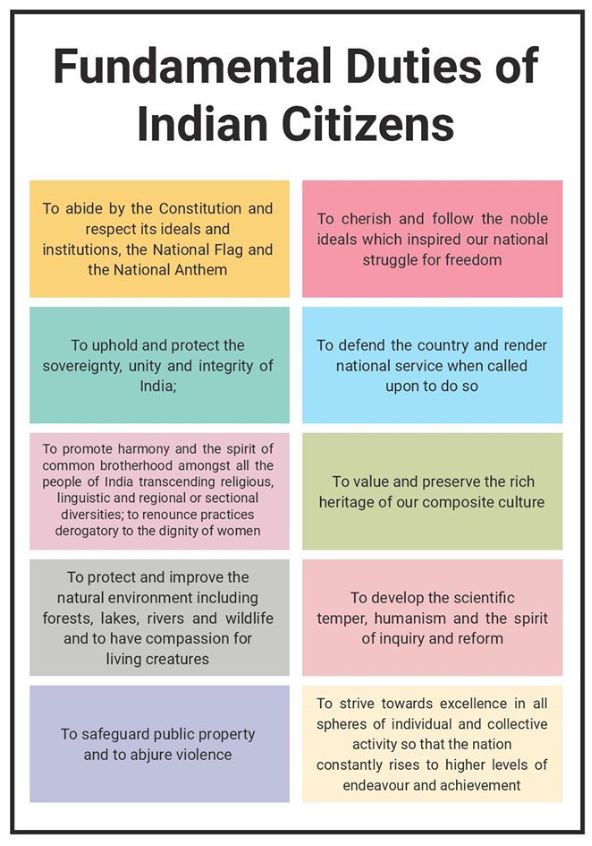Fundamental Duties of India
Fundamental Duties are the moral obligations of every citizen of India. They were added to the Constitution by the 42nd Amendment Act of 1976 on the recommendation of the Swaran Singh Committee. Unlike Fundamental Rights, duties are not enforceable by law, but they play a crucial role in promoting patriotism, civic responsibility, and social harmony.
Purpose and Significance
Promote National Unity – Citizens are encouraged to uphold the unity, integrity, and sovereignty of India.
Encourage Civic Responsibility – Duties guide citizens to act responsibly in society.
Complement Fundamental Rights – Rights come with responsibilities; respecting duties ensures the protection of rights.
Foster Respect for the Constitution and Institutions – Encourages respect for the law, democratic principles, and public property.
List of Fundamental Duties
Originally, 10 Fundamental Duties were listed under Article 51A of the Constitution. The 86th Amendment in 2002 added an 11th duty related to education.
The 11 Fundamental Duties are:
Respect the Constitution, the National Flag, and the National Anthem
Uphold the ideals and institutions of India.
Show respect for symbols that represent the country.
Cherish and Follow the Noble Ideals of the Freedom Struggle
Remember the sacrifices made by freedom fighters.
Keep the spirit of independence alive.
Uphold Sovereignty, Unity, and Integrity of India
Protect the country from threats, internal or external.
Work for national harmony and unity.
Defend the Country and Render National Service When Required
Be prepared to protect India if needed.
Serve the nation in times of emergency or crisis.
Promote Harmony and the Spirit of Common Brotherhood
Respect people of all religions, castes, and communities.
Prevent discrimination and social conflicts.
Preserve the Rich Heritage of Our Composite Culture
Protect monuments, traditions, languages, and art forms.
Encourage cultural awareness and pride.
Protect the Environment and Natural Resources
Safeguard forests, rivers, wildlife, and ecosystems.
Prevent pollution and ecological destruction.
Develop Scientific Temper, Humanism, and Spirit of Inquiry
Encourage rational thinking, research, and scientific progress.
Reject superstition, blind faith, and irrational beliefs.
Safeguard Public Property and Abjure Violence
Avoid damaging public property.
Promote peace and non-violence in society.
Strive for Excellence in All Spheres of Individual and Collective Activity
Encourage personal growth, learning, and contribution to society.
Achieve higher standards in work, education, and social service.
Provide Opportunities for Education to Children (Added by 86th Amendment)
Parents or guardians must ensure children attend school until the age of 14.
Supports the Right to Education under Article 21A.
Key Features of Fundamental Duties
Moral Obligations: They are not legally enforceable but carry ethical significance.
Universal Applicability: Apply to all citizens of India.
Promote Discipline and Responsibility: Encourage citizens to contribute positively to nation-building.
Complement Rights: Duties ensure the protection of the Fundamental Rights of others.
Importance in Daily Life
Encourages respect for law and order.
Promotes social harmony and tolerance among diverse communities.
Fosters environmental awareness and conservation.
Encourages active participation in civic duties and national development.
Conclusion
The Fundamental Duties of India act as a compass for responsible citizenship. They remind citizens that with the freedoms and rights granted by the Constitution, come obligations toward the nation, society, and fellow citizens. Observing these duties ensures that India remains strong, united, progressive, and harmonious.









I’ve been browsing on-line greater than three hours nowadays, yet I never found any attention-grabbing article like yours. It is pretty worth enough for me. Personally, if all web owners and bloggers made excellent content material as you did, the net will probably be a lot more useful than ever before.
F*ckin’ awesome things here. I’m very glad to see your post. Thanks a lot and i am looking forward to contact you. Will you kindly drop me a e-mail?